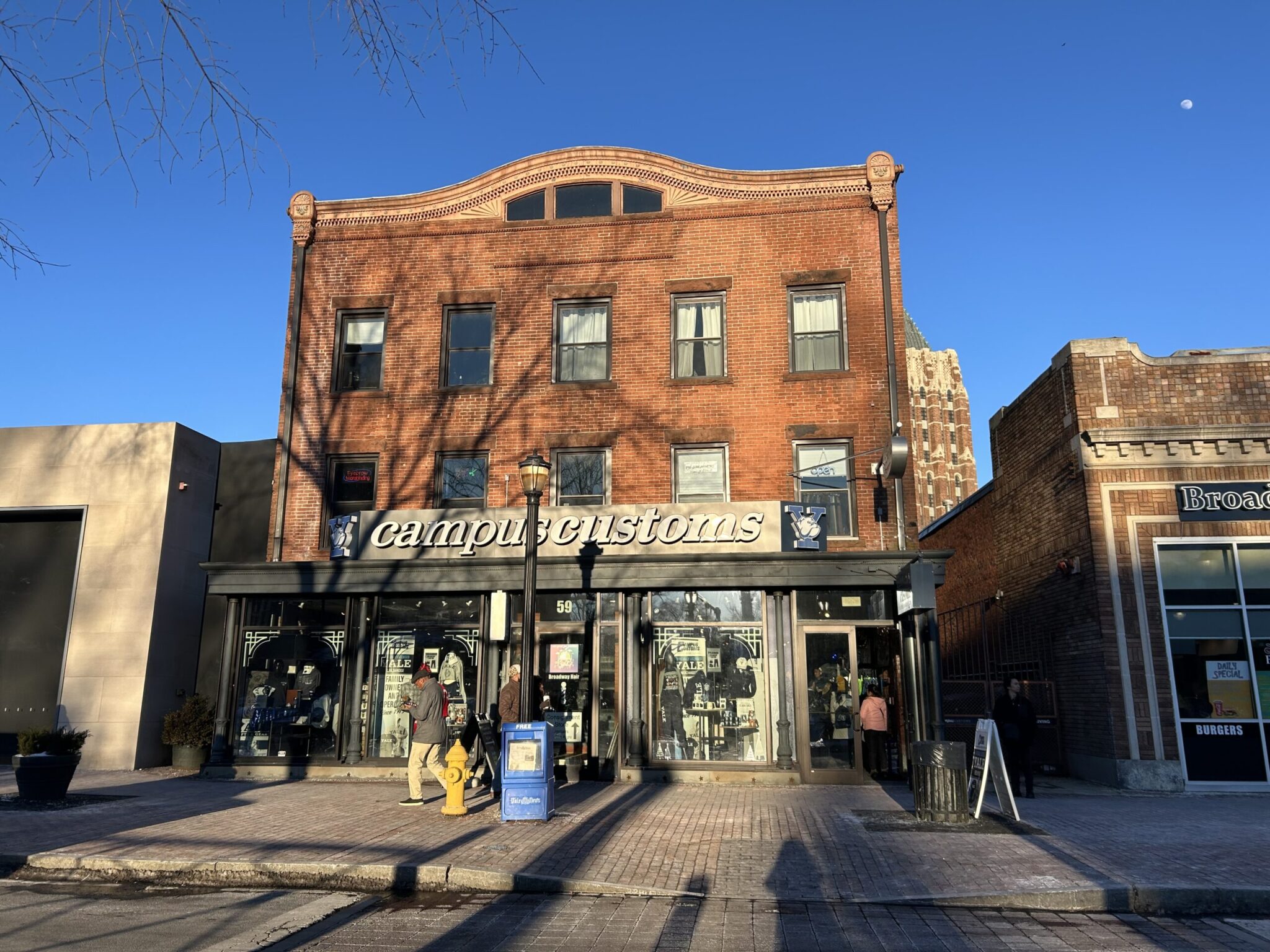Yale to send non-Yale tenants packing from Broadway apartments
After purchasing 59 Broadway in November, Yale will give non-Yale affiliated tenants one year to vacate their apartments. Current tenants have amassed almost 600 signatures in protest.

Laura Ospina, Contributing Photographer
Nick Rivera, 26, had finally found stability and a home in his one-bedroom apartment on 59 Broadway. Arriving in New Haven a little over a year ago, the last of three moves in three years, Rivera has loved chatting with the downstairs business owners, decorating his first solo apartment and has loved the safety he feels living there as a transgender man.
But because Rivera is not affiliated with Yale, he must leave his apartment by the end of the year.
After Yale purchased 59 Broadway in November, the handful of apartments in the building, as well as retailers like Campus Customs, came under new management: Elm Campus Partners, a property management company that manages Yale’s residential assets.
For Rivera, a new landlord meant the threat of yet another move. Under Elm Campus Partners policy, Yale’s rental properties are for Yale students and staff only. Elm Campus Partners notified Rivera and another non-Yale tenant via email on Dec. 12 that they can continue to stay in their apartments until 2025, but come the new year, their leases will not be renewed, according to initial reporting by the New Haven Independent.
“I’m a person, and I wish [Yale] would see me as one instead of an asset to move out,” Rivera said. “The policy doesn’t make a whole lot of sense to me, especially when they’re buying up buildings that people already live in. I’m mad for myself, but I would be mad for anyone who is in this situation because a home is important to someone, it’s a foundation.”
Following the email, Rivera created a petition and called on Yale to make an exception to its affiliate-only policy until the non-Yale tenants could either choose to leave or commit a legitimate tenant violation. The petition has since amassed 590 signatures. Signees condemned the University for pushing out New Haven residents, characterizing Yale’s “disrespectful” behavior as a “takeover” and an example of “gentrification.”
Rivera said that a month after he created the petition and his Yale and non-Yale neighbors raised concerns with the new management, he still has not heard back from Yale, leaving him “frustrated.”
“When the purchase of 59 Broadway was completed, the two non-Yale affiliated tenants were given the option of renewing their lease for one year in order to give them ample time to find new living arrangements,” Peart wrote in a statement to the News. “In order to provide these two residents additional flexibility, they also have the ability to terminate the lease at any time within that window if they find a better opportunity earlier.”
The University did not respond to a question about the reasoning behind the affiliate-only housing policy or about the alleged lack of response to the tenants’ concerns.
After its $7 million purchase of 51 and 57 Broadway, Yale now owns eight of the nine buildings on the north end of Broadway. In December, Lauren Zucker, the University’s associate vice president and director of New Haven affairs, told the News that Yale would honor all existing leases with the current tenants.
Yale’s dominance on Broadway, replete with a sign reading “The Shops at Yale” on the street island, dates back to the early 2000s, when the University began acquiring several properties in the area, according to Elihu Rubin ’99, associate professor of urbanism at the Yale School of Architecture.
“It shouldn’t come as a surprise that Yale has sought to acquire these Broadway properties,” Rubin wrote. “It is part of a clear, long-term strategy to control as much of the district as possible. Doing so reduces the risk of multiple property owners making decisions that Yale does not agree with or that do not fit its image for the Shops at Yale.”
Rivera was originally drawn to New Haven because of its vibrancy as a “walkable college town.” Although Rivera is willing to fight to stay at Broadway, he said that he is also realistic and currently looking for a new apartment in New Haven.
Rivera also said he was surprised by the number of signatures his petition has collected and touched by the support of both the New Haven and Yale communities in the comments on the petition and the New Haven Independent article. In at least this way, Rivera has avoided what he classified as the worst-case scenario: being kicked out of his apartment and no one caring.
“I would assume that Yale would want to attract different kinds of perspectives instead of just being a bubble,” Rivera said. “They’re pushing people out that aren’t in Yale, and you’re going to get a bubble with that.”
Yale purchased 51 and 57 Broadway on Nov. 17.







